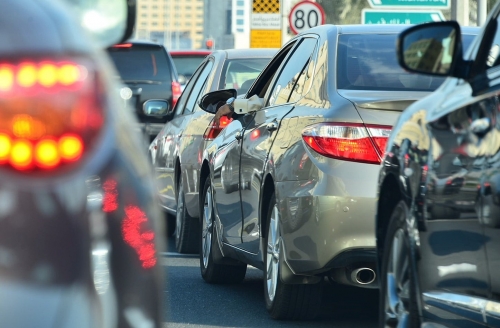‘Over 26,000 new cars hit Bahrain roads every year’
TDT | Manama
The Daily Tribune – www.newsofbahrain.com
Staff Reporter
Over 26,000 new cars hit Bahrain roads every year, which is leading to an increase in traffic congestion, according to a report by eGovernment Authority.
The Bahrain National Report highlights the increasing burden on the Kingdom’s infrastructure as the number of vehicles goes up day-by-day in an unprecedented manner.
“As congestion rates on the roads in the Kingdom have witnessed a continuous increase, as the density of vehicles on the roads exceeds 200 vehicles/km, while vehicles density exceeds about 500 vehicles per 1,000 people (two people per vehicle), and if the number of private cars continues to increase as mentioned, it is expected to be equal to the number of the country’s population by the year 2030,” the report says.
“To reduce traffic congestion, avoid its negative effects, and ensure smooth traffic, the Kingdom has adopted a series of integrated policies and procedures on two levels: expanding and improving the road network, and developing fast and efficient public transport.
These two levels constituted 45 per cent of the total policies and measures taken to address traffic congestion problems. “And at the level of Bahrain’s road network, it is known for its high quality, availability of an integrated infrastructure between all its transport systems, and its secure traffic, due to the investments injected towards its infrastructure that constituted a major component of the government’s budget over the past five decades,” it adds.
Since 2007, the Kingdom’s government has adopted a strategic plan and expansion programmes for the road network and flyovers at the main intersections to accommodate the increased traffic. As a result, Bahrain has achieved an advanced position around the world in the field of paved roads, with the proportion of these roads exceeding 85pc of the total lengths of the Bahraini road network, the report emphasizes.
“While the total lengths of the road network increased from 1,977 kms in the year 1995 to 4,940 kms in the year 2020, leading to a significant decrease in the area served by one kilometer of roads from 0.30 sq.km in the year 1995 to 0.16 sq.km in the year 2020.”
In Bahrain, traffic chaos has become a prominent problem that remains unsolved. Commuters continue to struggle with traffic chaos across the country despite the authorities devising many strategies in search of a solution.
School day timings and bus departures were rescheduled last month by the authorities as part of easing the traffic that erupted after the reopening of schools across the Kingdom. The move aimed at ensuring the interests of students, parents and commuters by implementing mechanisms to facilitate an easy flow of traffic across the Kingdom’s road network.
However, it hasn’t delivered expected results. According to studies done by many researchers, “Bah[1]rain is choking on traffic fumes and traffic congestion is a bigger threat than heavy industry. “The studies carried out in Bahrain revealed that most pollutants, such as nitrogen-oxide, were found to be heavily concentrated in areas with high traffic congestion, rather than industrial areas.
This shows the extent of the contribution of vehicles to increasing the pollution percentage in developed areas.” Government sources and experts say expanding the public transport systems remains the only remedy. “The Bahrain Metro project is one of the most important land transport projects providing a new sustainable mode of transportation in the Kingdom, aiming to achieve Bahrain’s Economic Vision 2030.
The project is part of the Strategic Projects Plan and comes as part of the government’s priority projects that are worth more than $30 billion. The plan to develop an integrated public transport network will contribute to raising the efficiency of transport services in the Kingdom.”
Related Posts

